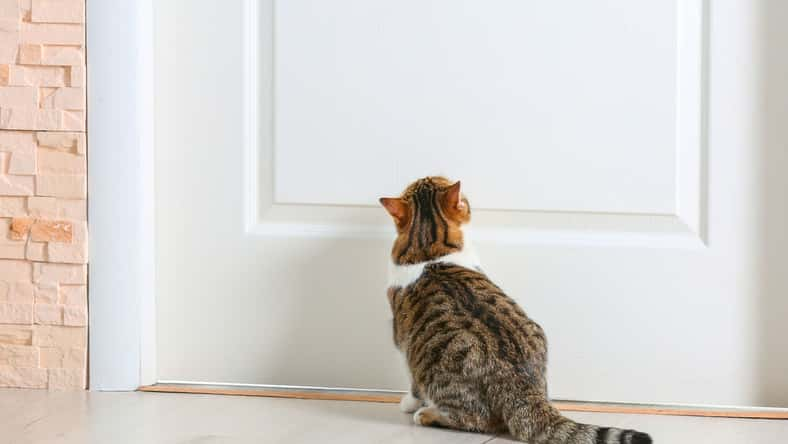Cats Hate Closed Doors Because They Have A Fear Of Missing Out And Like To Watch Over Everything That’s Happening In Their Domain

Why do cats hate closed doors so much? Every cat owner has witnessed their pet’s annoyance when faced with a closed door. The felines might stick a furry arm under the crack, attempting to find a way through, or paw at the door and meow nonstop.
A closed door is basically the biggest insult to cats. It creates a barrier to their freedom and their curiosity, preventing them from patrolling their domain.
Experts say that evolution and pet owners themselves contribute to a cat’s hatred of closed doors. Cats also have a fear of missing out (FOMO).
“It is a little bit of FOMO,” Dr. Karen Sueda, a board-certified veterinary behaviorist, said. “The FOMO of like, ‘I don’t know what’s on the other side, and I want to go see and figure it out.'”
Cats are naturally curious and territorial creatures. They like to watch over everything that’s happening in their territory, also known as their owner’s house.
When a door is open, the room may not be very interesting as your cat can see inside and knows what’s going on. But when the door is closed, cats will not be afraid to voice their objection and demand to get in and explore.
This type of control is a base instinct that helps them survive in the wild. They need to feel safe and secure from predators in their environment. In a domestic setting, the behavior seems a little strange since your cat might be seen attacking a door.
Cats also enjoy attention from their owners. A study from 2017 suggested that most cats actually prefer human interaction over other stimuli, like toys and food.
In addition, they do not understand that a closed door does not remain closed forever. All they know is that the spot they napped and ate in is suddenly gone, and they no longer have access to you. Cats become stressed when they can’t control their environment or if it changes.

Africa Studio – stock.adobe.com – illustrative purposes only, not the actual cat
To reduce anxiety in cats, owners should stay consistent with what areas of the house they want to block access to. If you don’t want your cat in the dining room, block access to it at all times, not just when guests are over.
You can also train your cat to become more used to closed doors if your cat’s contempt for them is becoming disruptive to your routine.
Condition your cat to understand that it has its own designated space in your home. Fill a room with toys, a litter box, food, and water. Let them stay in the room for short periods, increasing the time gradually.
If you have any concerns about your cat’s behavior, it is recommended to contact a veterinarian to rule out any health issues.
Sign up for Chip Chick’s newsletter and get stories like this delivered to your inbox.
More About:Animals





